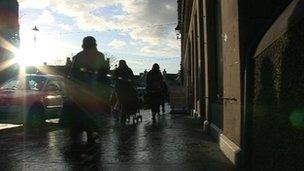Vitamin D advice issued for babies and pregnant women
- Published

Scots have low levels of vitamin D, due to a lack of sunshine
Scotland's chief medical officer has said children aged six months to five years should be taking daily vitamin D drops.
Sir Harry Burns has also warned that pregnant women should be taking the vitamin to protect against bone disease and other illnesses.
He has written to health professionals about the risk of vitamin D deficiency.
The letter said all pregnant and breastfeeding women should take a daily supplement containing 10 micrograms.
People aged 65 and over and people who are not exposed to much sun should also take a daily supplement containing 10 micrograms.
Vitamin D is important for healthy bones and teeth and a lack of the vitamin has also been linked by some studies to high rates of multiple sclerosis in Scotland.
The lack of sunshine and a diet low in oily fish are thought to be the main factors in Scots having a low level of the vitamin.
Sir Harry said the daily supplement for young children would help them meet the requirement of 7 to 8.5 micrograms of vitamin D per day.
Increase awareness
The chief medical officer's advice said babies who are being fed by infant formula will not need vitamin drops until they are receiving less than 500ml of formula a day, as these products are fortified with vitamin D.
Sir Harry said: "My colleagues and I are writing a joint letter to health professionals to increase awareness of this important issue, highlighting the fact there are steps that people who may be at risk of vitamin D deficiency, such as pregnant women, infants and young children, can take to avoid low levels.
"This is a restatement of advice I sent to health professionals in Scotland last year and contains important information about prescribing and recommending vitamin D supplements to those groups of the population at risk of vitamin D deficiency.
"Health professionals can make can make a significant difference to people's health by making those at risk aware of how important it is to make sure they get enough vitamin D, and how they can get access to these important daily supplements."
- Published20 December 2011
- Published4 October 2011
- Published24 March 2011
- Published19 September 2010